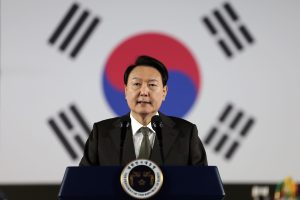South Korean President Yoon Suk-yeol’s first year in office was not covered in glory. In the early months, his administration lurched from gaffe to scandal to unforced error, painting a portrait of a president wholly out of his depth in his first-ever elected office. Those missteps cratered his approval rates, and his administration seemed perpetually stuck in crisis-response mode.
But as the first year of his presidency concludes, the ship has steadied. This may be a result of advances along the learning curve, but it also coincides with the jettisoning of his election-night promise to heal the deep polarization afflicting the country. That promise rang hollow when it was made, given the mood of the electorate that brought him to office. Instead, Yoon has seemingly concluded that cooperation with his political opponents is not possible and has turned to consolidating his base ahead of the 2024 National Assembly elections that will define his presidency.
What has emerged from this process is a president largely unshackled by concerns of political capital. Support from his base now appears unwavering, allowing Yoon to use the country’s deep polarization to push toward his vision for the future – controversy be damned. That vision is ill-defined, but has loosely been called neoliberal based on proposed reforms in education, labor, healthcare, and the national pension. He has also made redefining relations with Japan a centerpiece of his foreign policy.
To accomplish this turnaround, Yoon has taken the fight to the media, seized control of his own party, and watched on as prosecutors – an organization he was once the head of – reassert their prominence.
This new, harder-edged president emerged following the now-infamous hot mic incident on his calamitous first foreign trip in September 2022. The initial response saw Yoon’s People Power Party (PPP) file a complaint with the prosecution targeting the MBC journalist responsible for airing a video that apparently caught the president uttering obscenities while walking away from a brief exchange with U.S. President Joe Biden. Later, reporters working for MBC – a major terrestrial broadcaster – were banned from boarding Code One, the presidential aircraft, for Yoon’s overseas trips.
The retaliation against MBC served as red meat to Yoon’s base. In a survey by the National Barometer Survey (NBS) at the time, 64 percent of those who support the president’s PPP approved of the ban. Meanwhile, 65 percent of the public overall said banning MBC reporters from Code One was inappropriate. That included nine in 10 (92 percent) supporters of the Democratic Party (DP), the main opposition, and 68 percent of independents. Yoon moved forward undeterred.













